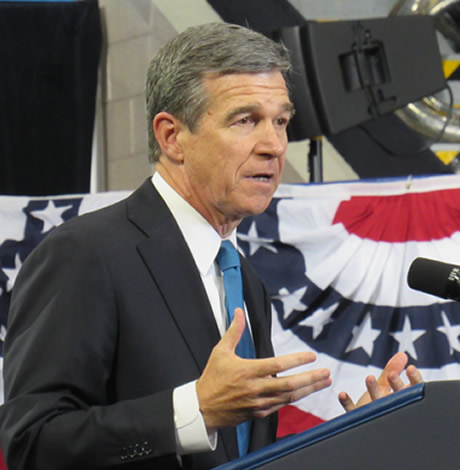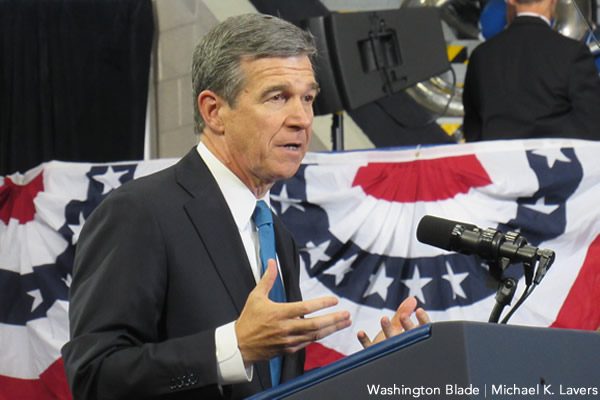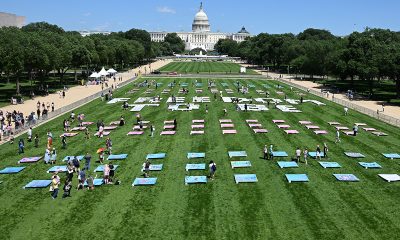National
Cooper signs deal to replace HB2 as LGBT advocates cry betrayal


North Carolina Gov. Roy Cooper has endorsed a HB2 deal vehemently opposed by LGBT advocates. (Washington Blade file photo by Michael K. Lavers)
North Carolina Gov. Roy Cooper signed Thursday a proposal to replace North Carolina’s anti-LGBT House Bill 2 with another law enabling anti-LGBT discrimination, prompting cries of betrayal from LGBT advocates who say he disregarded his campaign promise to sign the repeal in full.
The measure, House Bill 142, was approved on a bipartisan basis Thursday in the Senate by a vote of 32-16 and the House by vote of 70-48 after Republican leaders and Cooper announced the deal late Wednesday night. Cooper announced during a news conference later in the day he signed the bill.
“It doesn’t fully correct it,” Cooper said. “I know we got more to do, and I think some people are unhappy because it doesn’t fully correct it, and I wish we could have, and I wish this time limit on being able to do the additional protections for discrimination could be sooner, but that was the best deal that we could get.”
Cooper insisted “not only provides for LGBT protections, but opens the door for more,” even though no aspect of the new law prohibits discrimination against LGBT people. The governor said as part of the negotiations he was able to stop LGBT rights from coming up for a referendum in North Carolina or a “religious freedom” measure that would enable discrimination against LGBT people.
After having campaigned not only on HB2 repeal, but support for statewide LGBT non-discrimination protections, Cooper said a bill that would bar discrimination against LGBT people throughout North Carolina remains his goal.
“In a perfect world, we would have repealed HB2 today and added full statewide protections for LGBT North Carolinians,” Cooper said. “Unfortunately, our supermajority Republican legislature will not pass these protections. But this is an important goal that I will keep fighting for.”
The new law repeals HB2, but critics say it still enables discrimination. Section 1 bars state agencies, including cities and the University of North Carolina, from the “regulation of access” to multiple-occupancy restroom, showers or changing facilities except in accordance with the legislature, which essentially leaves transgender people seeking to use those facilities vulnerable to harassment or discrimination.
Section 2 prohibits municipalities from enacting ordinances on private employment or public accommodations, which would bar cities from passing LGBT non-discrimination measures in those areas. Section 3 of the bill would sunset that provision on Dec. 1, 2020.
Chris Sgro, executive director of Equality North Carolina, expressed displeasure on Twitter over after worked to elect Cooper to the governor’s office only to have sign the compromise.
Bitterly disappointed in a man I truly believed was the future of North Carolina https://t.co/EJIdj8xwTj #ncpol #ncga
— Chris Sgro (@cristoferosgro) March 30, 2017
In a rare criticism of Democrats, Chad Griffin, president of the Human Rights Campaign, denounced Cooper on Twitter, saying the governor was being misleading by saying he signed HB2 repeal.
.@RoyCooperNC taking credit for repealing #HB2. He did no such thing. Instead he signed new version of #HB2 and betrayed campaign promise.
— Chad Griffin (@ChadHGriffin) March 30, 2017
The outrage from LGBT advocates over Cooper signing the HB2 replacement is a far cry from their view of him last year when HB2 was first signed into law and Cooper, as North Carolina attorney general, announced he wouldn’t defend HB2 against legal challenges in court.
The deal was struck came in the same week the National Collegiate Athletic Association said it will make decisions on events. The NCAA has said North Carolina won’t be considered for championship events through 2022 “absent any change” to HB2. According to the Associated Press, North Carolina cities, schools and other groups have offered more than 130 bids for such events.
After Cooper signed the law, LGBT advocates — the North Carolina NAACP, the Human Rights Campaign, Equality North Carolina, the National Center for Transgender Equality and the Freedom Center for Social Justice — issued a joint statement calling on the NCAA to come out against the measure.
“We call on the NCAA to oppose this shameful HB2.0 bill in North Carolina, and not to reward lawmakers who have passed this so-called ‘deal’ which is an affront to the values we all hold,” the statement says. “This bill is anti-worker, anti-access to the courts, and anti-LGBTQ. It violates all basic principles of diversity, inclusion and basic civil rights. Fundamentally, any moratorium on civil rights is not a compromise, it is a contradiction with the principle of equal protection under the law and our moral values.”
The NCAA has yet to articulate publicly a position on the HB2 deal and whether it will now allow North Carolina to host championship games, although Cooper said during his news conference he expects sports games to return the state.
UPDATE: During a subsequent news conference, NCAA President Mark Emmert said a decision will come next week on whether the changes to HB2 are sufficient enough for the league to plan championship games in the state.
“I’m personally very pleased that they have a bill to debate and discuss,” Emmert said. “The politics of this in North Carolina are obviously very, very difficult. But they have passed a bill now and it will be a great opportunity for our board to sit and debate and discuss it.”

The Comings & Goings column is about sharing the professional successes of our community. We want to recognize those landing new jobs, new clients for their business, joining boards of organizations and other achievements. Please share your successes with us at [email protected].
Congratulations to Gil Pontes III on his recent appointment to the Financial Advisory Board for the City of Wilton Manors, Fla. Upon being appointed he said, “I’m honored to join the Financial Advisory Board for the City of Wilton Manors at such an important moment for our community. In my role as Executive Director of the NextGen Chamber of Commerce, I spend much of my time focused on economic growth, fiscal sustainability, and the long-term competitiveness of emerging business leaders. I look forward to bringing that perspective to Wilton Manors — helping ensure responsible stewardship of public resources while supporting a vibrant, inclusive local economy.”
Pontes is a nonprofit executive with years of development, operations, budget, management, and strategic planning experience in 501(c)(3), 501(c)(4), and political organizations. Pontes is currently executive director of NextGen, Chamber of Commerce. NextGen Chamber’s mission is to “empower emerging business leaders by generating insights, encouraging engagement, and nurturing leadership development to shape the future economy.” Prior to that he served as managing director of The Nora Project, and director of development also at The Nora Project. He has held a number of other positions including Major Gifts Officer, Thundermist Health Center, and has worked in both real estate and banking including as Business Solutions Adviser, Ironwood Financial. For three years he was a Selectman, Town of Berkley, Mass. In that role, he managed HR and general governance for town government. There were 200+ staff and 6,500 constituents. He balanced a $20,000,000 budget annually, established an Economic Development Committee, and hired the first town administrator.
Pontes earned his bachelor’s degree in political science from the University of Massachusetts, Dartmouth.
Kansas
ACLU sues Kansas over law invalidating trans residents’ IDs
A new Kansas bill requires transgender residents to have their driver’s licenses reflect their sex assigned at birth, invalidating current licenses.

Transgender people across Kansas received letters in the mail on Wednesday demanding the immediate surrender of their driver’s licenses following passage of one of the harshest transgender bathroom bans in the nation. Now the American Civil Liberties Union is filing a lawsuit to block the ban and protect transgender residents from what advocates describe as “sweeping” and “punitive” consequences.
Independent journalist Erin Reed broke the story Wednesday after lawmakers approved House Substitute for Senate Bill 244. In her reporting, Reed included a photo of the letter sent to transgender Kansans, requiring them to obtain a driver’s license that reflects their sex assigned at birth rather than the gender with which they identify.
According to the reporting, transgender Kansans must surrender their driver’s licenses and that their current credentials — regardless of expiration date — will be considered invalid upon the law’s publication. The move effectively nullifies previously issued identification documents, creating immediate uncertainty for those impacted.
House Substitute for Senate Bill 244 also stipulates that any transgender person caught driving without a valid license could face a class B misdemeanor, punishable by up to six months in jail and a $1,000 fine. That potential penalty adds a criminal dimension to what began as an administrative action. It also compounds the legal risks for transgender Kansans, as the state already requires county jails to house inmates according to sex assigned at birth — a policy that advocates say can place transgender detainees at heightened risk.
Beyond identification issues, SB 244 not only bans transgender people from using restrooms that match their gender identity in government buildings — including libraries, courthouses, state parks, hospitals, and interstate rest stops — with the possibility for criminal penalties, but also allows for what critics have described as a “bathroom bounty hunter” provision. The measure permits anyone who encounters a transgender person in a restroom — including potentially in private businesses — to sue them for large sums of money, dramatically expanding the scope of enforcement beyond government authorities.
The lawsuit challenging SB 244 was filed today in the District Court of Douglas County on behalf of anonymous plaintiffs Daniel Doe and Matthew Moe by the American Civil Liberties Union, the ACLU of Kansas, and Ballard Spahr LLP. The complaint argues that SB 244 violates the Kansas Constitution’s protections for personal autonomy, privacy, equality under the law, due process, and freedom of speech.
Additionally, the American Civil Liberties Union filed a temporary restraining order on behalf of the anonymous plaintiffs, arguing that the order — followed by a temporary injunction — is necessary to prevent the “irreparable harm” that would result from SB 244.
State Rep. Abi Boatman, a Wichita Democrat and the only transgender member of the Kansas Legislature, told the Kansas City Star on Wednesday that “persecution is the point.”
“This legislation is a direct attack on the dignity and humanity of transgender Kansans,” said Monica Bennett, legal director of the ACLU of Kansas. “It undermines our state’s strong constitutional protections against government overreach and persecution.”
“SB 244 is a cruel and craven threat to public safety all in the name of fostering fear, division, and paranoia,” said Harper Seldin, senior staff attorney for the ACLU’s LGBTQ & HIV Rights Project. “The invalidation of state-issued IDs threatens to out transgender people against their will every time they apply for a job, rent an apartment, or interact with police. Taken as a whole, SB 244 is a transparent attempt to deny transgender people autonomy over their own identities and push them out of public life altogether.”
“SB 244 presents a state-sanctioned attack on transgender people aimed at silencing, dehumanizing, and alienating Kansans whose gender identity does not conform to the state legislature’s preferences,” said Heather St. Clair, a Ballard Spahr litigator working on the case. “Ballard Spahr is committed to standing with the ACLU and the plaintiffs in fighting on behalf of transgender Kansans for a remedy against the injustices presented by SB 244, and is dedicated to protecting the constitutional rights jeopardized by this new law.”
National
After layoffs at Advocate, parent company acquires ‘Them’ from Conde Nast
Top editorial staff let go last week

Former staff members at the Advocate and Out magazines revealed that parent company Equalpride laid off a number of employees late last week.
Those let go included Advocate editor-in-chief Alex Cooper, Pride.com editor-in-chief Rachel Shatto, brand partnerships manager Erin Manley, community editor Marie-Adélina de la Ferriére, and Out magazine staff writers Moises Mendez and Bernardo Sim, according to a report in Hollywood Reporter.
Cooper, who joined the company in 2021, posted to social media that, “Few people have had the privilege of leading this legendary LGBTQ+ news outlet, and I’m deeply honored to have been one of them. To my team: thank you for the last four years. You’ve been the best. For those also affected today, please let me know how I can support you.”
The Advocate’s PR firm when reached by the Blade said it no longer represents the company. Emails to the Advocate went unanswered.
Equalpride on Friday announced it acquired “Them,” a digital LGBTQ outlet founded in 2017 by Conde Nast.
“Equalpride exists to elevate, celebrate and protect LGBTQ+ storytelling at scale,” Equalpride CEO Mark Berryhill said according to Hollywood Reporter. “By combining the strengths of our brands with this respected digital platform, we’re creating a unified ecosystem that delivers even more impact for our audiences, advertisers, and community partners.”
It’s not clear if “Them” staff would take over editorial responsibilities for the Advocate and Out.




















